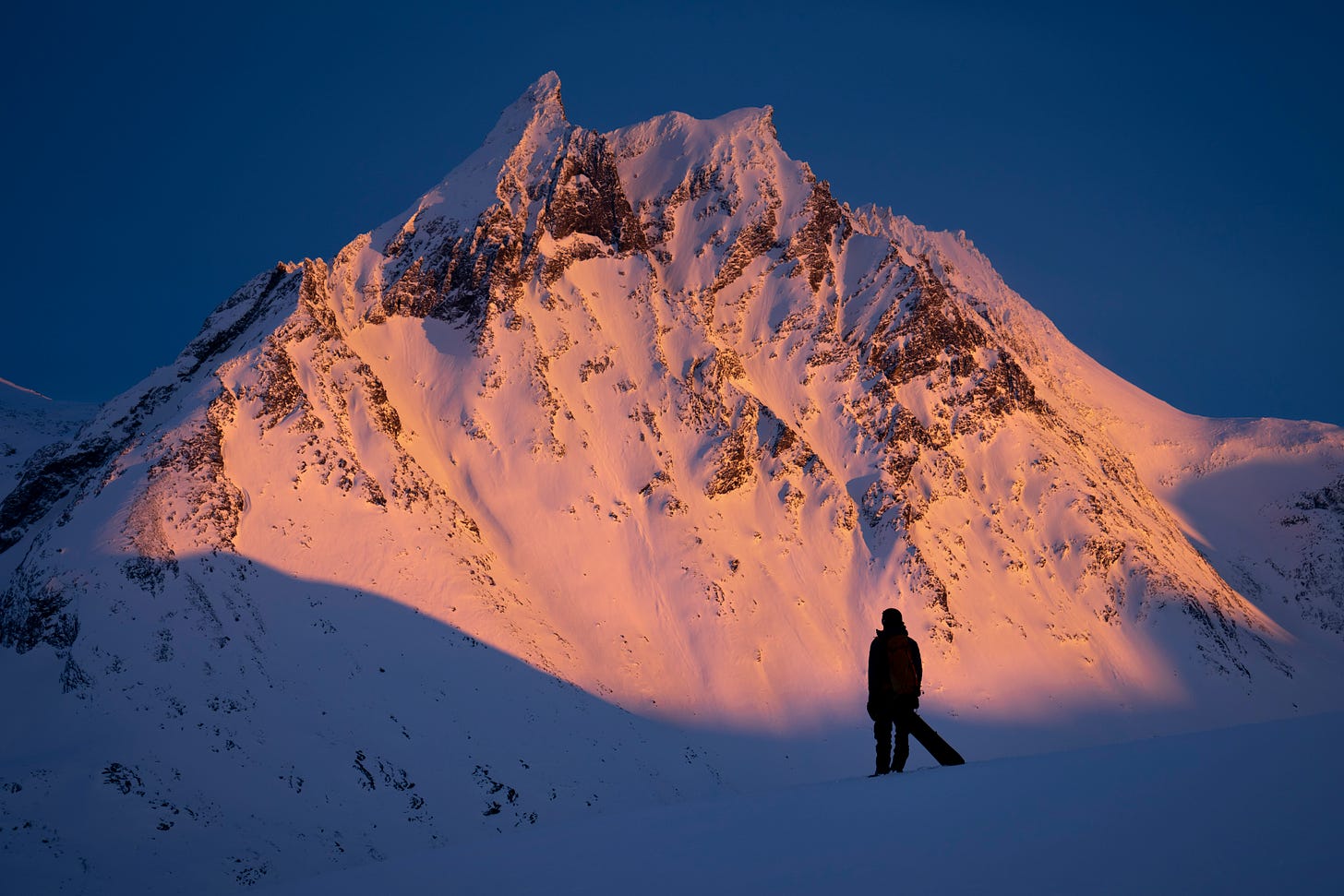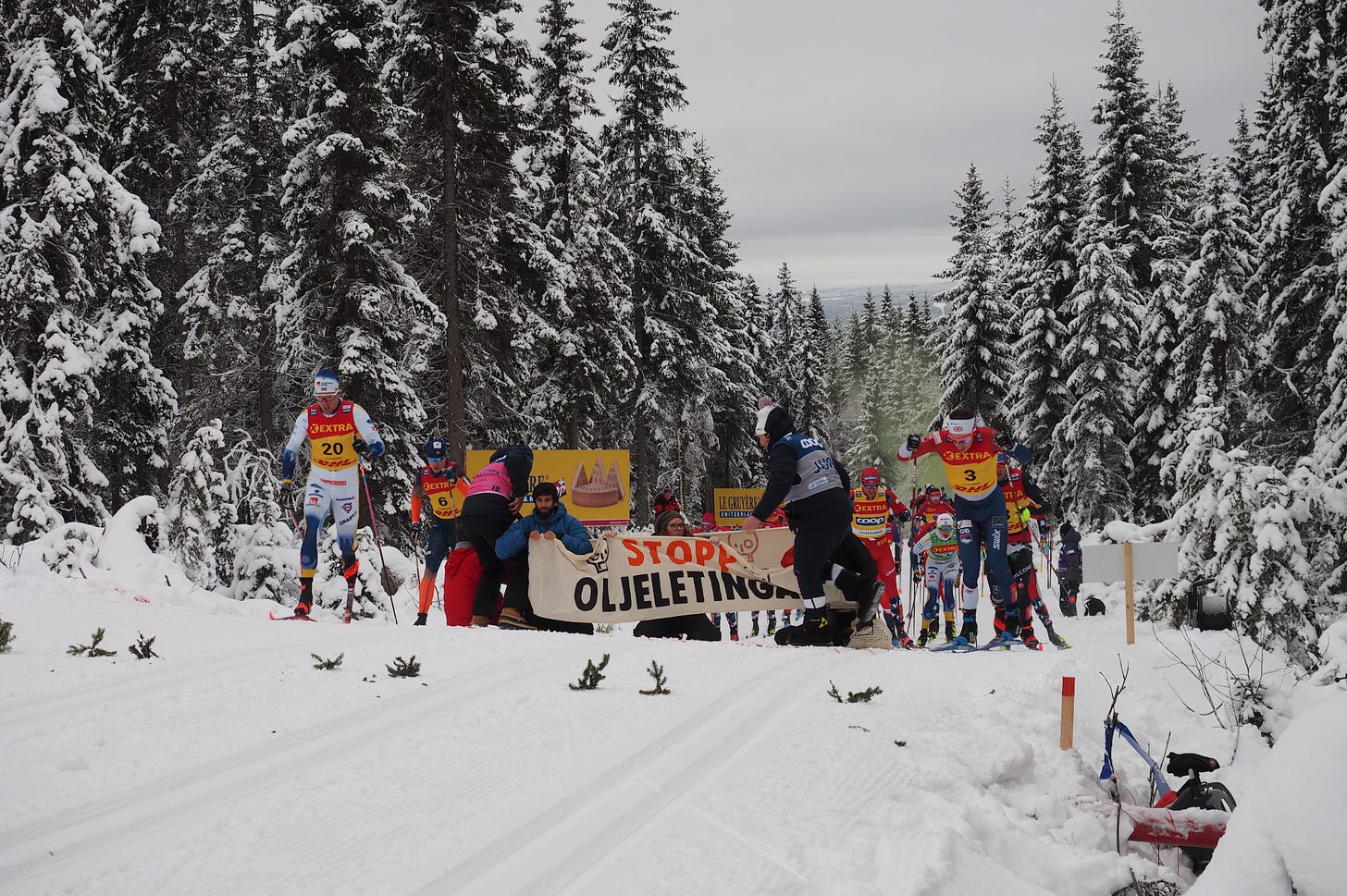Calum Macintyre: 5 Reasons Our Community Does Not Genuinely Engage
In this special guest post, exclusively for paid subscribers, disruptive activist Calum on the apathy among our community - and how to solve it.
I was inspired to write this after seeing Matt's recent posts about the protests against sewage dumping across the UK. His Instagram posts clearly highlighted the relatively low turnout (considering the absurdity of sewage companies saving money by dumping waste into the sea!), as well as the lack of participation from the surfing and swimming communities, who are directly affected by these profit-driven companies' actions.
This issue has been on my mind for years. And I know many people, and organisations such as Protect Our Winters and Surfers Against Sewage, have been working hard to engage the outdoor community in the climate crisis.
Despite this - even in 2023! - our community as a whole remains somewhat politically disengaged from these issues. Just take a glance at the ‘Big One’ Extinction Rebellion climate protest in London last April, where 60,000 people marched demanding an end to new oil licensing. The only outdoor brands and organisations visibly present and encouraging the outdoor community to join were Patagonia, Finisterre, and Surfers Against Sewage. Where were all the others? As people who spend so much time in nature, witnessing the disappearance of glaciers and the dumping of waste into the sea, you would think more of us would be on the front lines of these issues.
Having been involved in the climate movement for some years, I have often been asked by people who have no interest in snow sports or climbing, "Where the hell are all of you?" I have found it difficult to respond to this question. In this piece, I will present my five reasons why I believe our community is not more engaged and why I think more of us should participate in disruptive protests.
“One billion people facing heat stress does not mean they will simply feel a little warm and need to use air conditioning. It means that many of those people will die or be forced to migrate as the heat becomes unbearable for us humans”.
While I am from the UK, I currently reside in Norway and am part of Stopp Oljeletinga (Stop Oil Exploration). We are connected to a group of campaigns, including Just Stop Oil in the UK and Letze Generation in Germany, which employ direct action and disruption to advocate for concrete legislative changes, such as halting new oil licenses or implementing speed limits on motorways in Germany.
In the UK, these tactics, which include disrupting sports events and blocking public roads, have garnered significant attention, sparking an ongoing debate about their effectiveness. Personally, I did not immediately jump into this type of activism. It has been a gradual journey, during which I considered my individual carbon footprint, signed petitions, peacefully protested outside oil company offices, engaged in divestment campaigns, and explored other established methods of taking action.
“Having been involved in the climate movement for some years, I have often been asked by people who have no interest in snow sports, surfing or climbing, ‘Where the hell are all of you!?’”
For me, everything changed during a talk I gave to the Norwegian ski community on climate policy a few years ago. During the talk, I uttered a sentence that resonated deeply: "We are on the path to 2.7 degrees of warming, and if we surpass 2 degrees, one billion people will experience heat stress." As I spoke those words to the audience, I felt a lump in my throat as I struggled to vocalise them. One billion people facing heat stress does not mean they will simply feel a little warm and need to use air conditioning. It means that many of those people will die or be forced to migrate as the heat becomes unbearable for us humans. When I uttered that statement, it felt like a punch to the stomach. At that moment I realised we must prioritise this crisis on the political agenda, even if it means resorting to disruptive tactics.
I don't intend to be overly dramatic, but it is important that we begin to grasp that the climate crisis entails much more than missing a few powder days in the Alps, or the end of summer glacier riding. Only when we fully comprehend the magnitude of the situation are we willing to stand up and take the necessary action.

1. Soft climate denial
I believe many of us are in a state of soft climate denial. Soft climate denial differs from the outright climate denial exhibited by individuals like Donald Trump, for example. Most of us do acknowledge that the climate crisis is real and human-caused. However, we fail to grasp the true severity of the situation. A recent report, released last week, declared that the Earth has already surpassed its safe threshold for human habitation. We are currently experiencing a 1.2 degree increase in global warming, and there is a 50% likelihood that we will exceed 1.5 degrees within the next five years.
You can see this in action when it comes to the way the outdoor industry talks about the climate crisis, as if it is something that will primarily impact the sports we love. Sure, the climate crisis means we’ll be able to go skiing or snowboarding less. But this approach doesn’t really convey the the grave human rights atrocity this situation truly represents.
If we continue at our current pace, there could be over a billion climate refugees by 2050. To be blunt, this means that entire societies will collapse. I believe that if we fully comprehended the reality of this situation, we would all be taking to the streets, doing everything within our power to demand a change in the status quo.
2. There’s a lack of political will
The solution here isn’t some miracle to come along and save the day. Instead, what we need is a factor that has consistently been absent throughout history when it comes to great moments of change and has only been achieved through disruptive activism: political will.
After all, the solutions to the climate crisis are within our reach. We have renewable energy technologies, affordable and accessible public transportation, a circular economy, energy-efficient homes, and the means to protect and restore nature. What we lack is the political will to implement these solutions.
A prime example of this can be seen in the case of oil licensing in the UK. The Secretary-General of the United Nations warns us that countries increasing fossil fuel production are dangerous radicals. A group of 700 scientists emphasises that issuing more licenses will push us beyond safe climate limits. But our government disregards these warnings and continues to grant more and more licenses for fossil fuel exploration. It's hard to ignore the influence of the millions of pounds that the Conservatives receive in funding from the fossil fuel industry. The crucial point here is that it falls upon us to generate the political will for change, just as it has at countless points throughout in history.
We were not magically blessed with the right to vote for both men and women, the weekend off, or civil rights. People stood up and demanded these rights. That is precisely what we must do in 2023 to secure the right to a liveable climate.
3. Protest is supposed to be disruptive and annoying
I believe that those of us in the climate and environmental movement have become accustomed to coming together periodically, demanding action, and then returning home to store our placards until the next occasion. This has created a sense that the climate crisis is not an immediate crisis, but something that lies ahead in the future. But we must recognise that for protests to be effective, they need to be disruptive and annoying—that is literally the point. People need to be confronted directly with the issue, and the normal flow of daily life must be interrupted to make them understand that we are indeed facing a crisis.
As mentioned earlier, there were 60,000 people marching in London in April for the ‘Big One’ Extinction Rebellion protest. For XR, this represented a departure from their usual more disruptive protest methods, something evident in the way the protest was covered by national media. Although it received some media coverage on the day, it did not garner nearly the level of attention it deserved.
Fast forward a few weeks, and the front pages were dominated by a photo of an activist leaping onto a snooker table at The Crucible, orange powder billowing in the air, demanding a halt to all new oil licensing. The fact that this act generated more attention and sparked more debate than 60,000 people marching is a powerful illustration of the effectiveness of disruptive activism. Historical social movements did not quietly request change; they stood up and used any nonviolent means necessary to prioritise the issue and bring about the necessary change.
The suffragettes were not popular while they were smashing windows and going on hunger strikes. Yet today, we view them as heroes. At the time of his death, 75% of Americans disapproved of Martin Luther King, Jr. Today, he is revered as a hero.
Many people disapprove of the tactics employed by organisations like Just Stop Oil, suggesting there are better ways to achieve our goals. My response to those individuals would be to show us the superior methods through which we can bring about the necessary change - either now or throughout history. I have had conversations with friends who disapproved of disrupting public spaces, claiming that they aligned more closely with organisations like Greenpeace or Friends of the Earth. However, when I asked them when was the last time they signed a Friends of the Earth petition, the answer was inevitably "well...never."
It is perfectly fine for individuals to believe that disruptive tactics are not their preferred approach. However, if that's the case, they should engage with the movement in other ways that they do approve of. The key is to actively participate in the pursuit of change, rather than passively observing from the sidelines.
4. There is too much focus on individuals
One of the main obstacles preventing the outdoor industry, particularly in Europe, from becoming a more influential force for political action on climate is the emphasis on individual actions. It makes me cringe every time I see another athlete in the snow sports industry boasting about their new electric car sponsorship. Organisations like Protect Our Winters UK have made commendable efforts to shift the focus toward the systemic changes that are necessary, rather than solely individual actions. However, within our community, there are still many who propagate the idea that we can solve the climate crisis by simply taking the train, becoming vegetarian, or buying an electric car.
I understand that many people feel hesitant to engage in political action for fear of being labeled as hypocrites because they may still use petroleum-based products like snowboards or drive diesel cars. We need to let go of this notion of being perfect climate activists because the truth is that perfection does not exist (trust me, I have tried).
Instead, we must recognise that the system itself is broken, and the way to fix a broken system is by taking to the streets and demanding change. A prime example of the need for political action is the recent reduction in air passenger duty for domestic flights in the UK, which was slashed from £13 to £6.50 on April 1st (unfortunately, not an April Fools' joke). This has resulted in a surge of new internal flights, a highly detrimental development during a climate crisis. Imagine if the UK had followed France's lead and banned short-haul flights, prioritising train travel instead. These are the significant systemic changes we require.
I am not suggesting that reducing our individual carbon footprints is a bad thing. However, it is vital for us as members of the outdoor community to realise that engaging in political action should be our top priority, regardless of whether we occasionally take flights or drive cars. By focusing on political action, we can drive the necessary systemic changes that will have a far greater impact on combating the climate crisis.
5. Privilege sets us back
The outdoors has historically been a space dominated by individuals like myself - a 30-year-old white man who has found it relatively easy to feel comfortable in this environment. However, this lack of inclusivity poses a significant challenge for us in becoming more politically engaged in addressing the climate crisis. Other groups in society face greater difficulties in feeling that outdoor sports are accessible to them, and this is a major obstacle we must confront. Unlike some marginalised communities, individuals like myself do not have recent experiences of having to fight for basic rights, such as the right to vote or the right to sit on a bus with people of different races, as was the case in 1950s America. This complacency within the outdoor community and industry hampers our ability to mobilise politically on issues that will profoundly impact us: such as the climate crisis.
Interestingly, the majority of individuals I engage with in climate activism are women. When I speak with them about this issue, they express that their understanding of Reasonthe need to stand up and demand political change stems from their own experiences of fighting for their rights. For the outdoor community to become a more politically active space, it must become more welcoming and inclusive for everyone. Moreover, individuals like myself need to recognise and acknowledge our privilege. This shift in perspective would significantly contribute to fostering a culture of political action within the outdoor community.
If you are interested in getting involved, there are various ways to contribute. In the UK, you can join the slow marches organised by Just Stop Oil, which take place in London every day until new oil licensing is halted. You can sign up for a slow march on their website (https://juststopoil.org/). Remember that you don't necessarily have to be on the streets to make a difference. The movement requires individuals with diverse skills, which are abundant within our community, ranging from graphic design to fundraising.
If you live outside the UK, you can check if there is a campaign in your country by visiting www.a22network.org.
Got a story you want to pitch me? I pay for contributions! Let me know if so!








As the protest campaigns linked to 'Fight for the Bight' in Australia and 'Right to Roam' in the UK show, numbers on the ground matter. Turning up matters. Collective action matters. Action sports folk are great at visual media and storytelling, so our participation in protest is necessary ethically and politically, but it's also very effective in promoting the issues in relatable ways to wide audiences.
Second time today I am reminded that is better to be an imperfect activist than a perfect inactivist. Thanks again for the strong nudge that we all need.
Side note: We shall see what France really does for Train :P